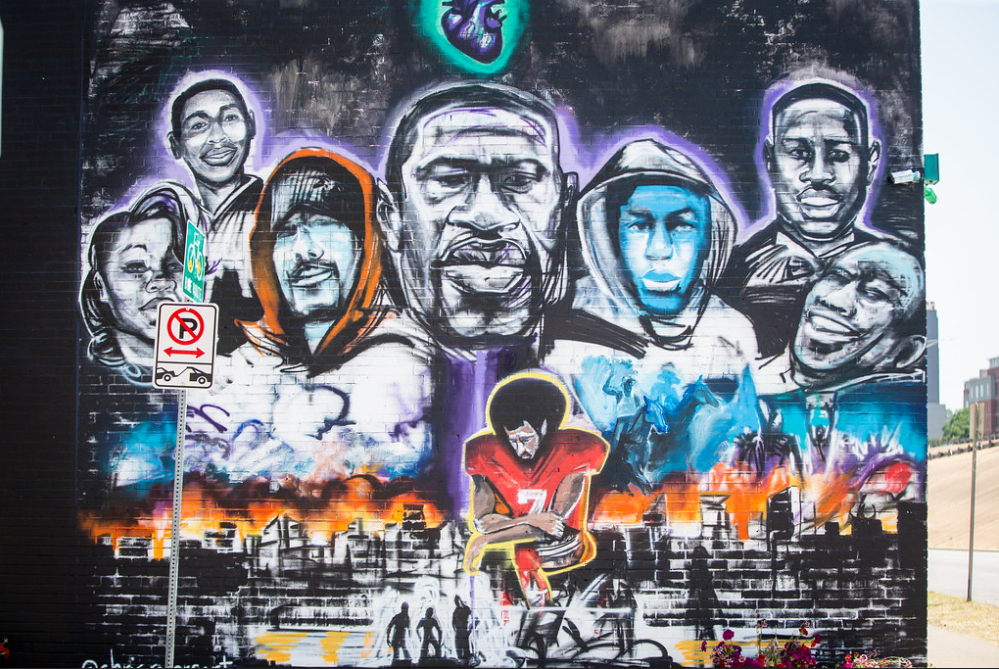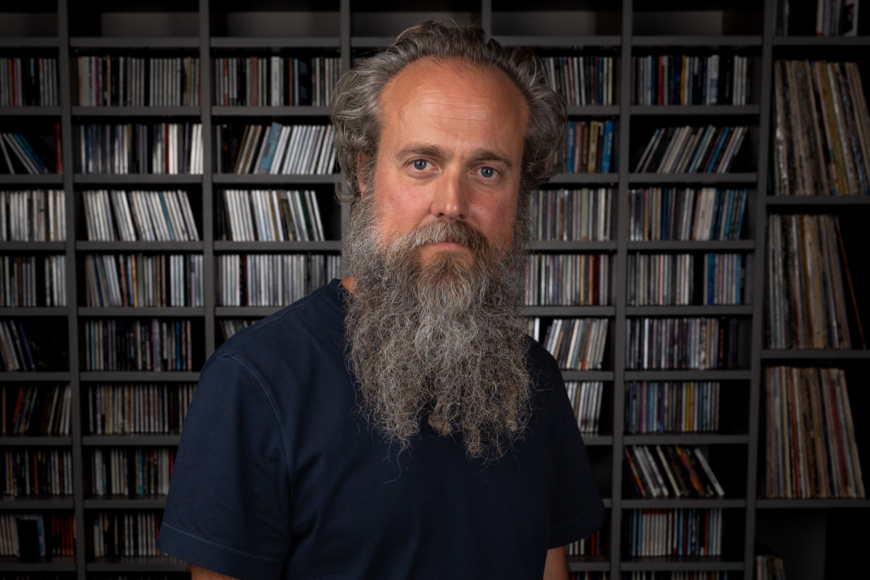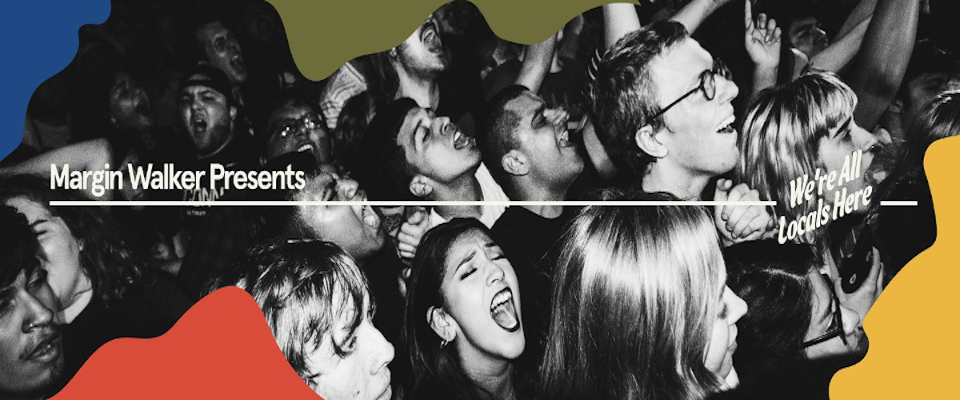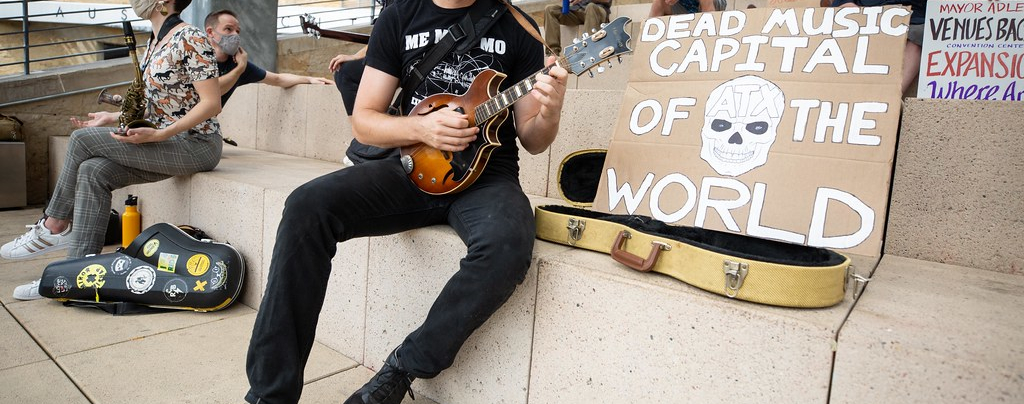A mural in honor of George Floyd and the larger Black Lives Matter movement created by local artist Chris Rogers. Michael Minasi/KUT
Have recent events awakened the world to injustice? Six Black Austin artists discuss dealing with a lifetime of oppression, police violence, and the ways systemic racism surfaces in the Austin music scene
By Jeff McCord
The killing of George Floyd has resulted in a global eruption of outrage. For a pandemic-stricken world already on edge, yet another death of an unarmed African American at the hands of police served as a linchpin, triggering huge demonstrations in virtually every major city worldwide. They are still ongoing, and their message is loud and clear: Enough.
As we watch these events unfold, everyone has begun to examine our own worlds, our cities, our work and social situations. How has bias and systemic racism played a role, knowingly or unknowingly, within each of us?
Over the past number of days, I have spoken separately with several black Austin musicians (Jackie Venson, Megz from Magna Carda, The Teeta, Chief Cleopatra, Mobley and Tee Double) to gauge their reactions to the upheaval. Each of them came at the situation from their own perspectives. While our conversations all moved to different places, I asked more or less the same questions of all of them – beginning with this one: Why now?
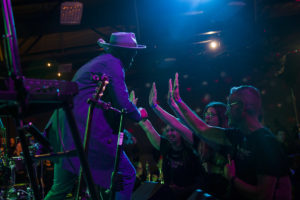
MOBLEY: “A lot of the distractions that keep people from getting activated around these things are gone. And there’s the social position that a lot of people have been left in as a result of the mishandling of the pandemic. You have people who are out of work. They’re seeing no support from the government. They’re watching as the Fed creates a trillion dollars out of thin air and then it goes to corporations, and they get a twelve hundred dollar check. And maybe, if they’re lucky, they get some minimal unemployment for a set amount of time. I think a lot of people were already talking more loudly about the systems of power. This just came along at a moment where people’s dissatisfaction was already high and they had time on their hands. They were stuck in their homes and many of them on the low end, they didn’t have a job to go to every day. I should also say that a lot of credit should be given to the people who’ve been organizing around these issues for decades, because they laid the groundwork for this. We’re all using their words now, we’re all standing on their work.”
Emotions are raw and hard-felt in the wake of all this.
MEGZ: “You feel so hopeless,. As a black woman, my shared existence is to literally be a part of the movement; I have no way of escaping it. But this time around, I felt so charged up to push out the sadness and bring in more productivity. It’s feeling a lot more urgent than it has in the past. This boiled-over frustration where you can’t just take the bare minimum anymore, you know? You experience the pattern over and over and over again. Toni Morrison says the one thing that she finds very remarkable about the Rodney King incident was that we waited for justice and we did not react immediately. We literally thought that the system would do the right thing. This time around, it’s ignorant to even believe that. We are no longer waiting for someone to come and deliver something that should have been delivered 400 years ago. You have to take matters into your own hands. And I think that’s what feels more immediate about this situation. You see that people aren’t letting up. This is exactly what she was talking about.”
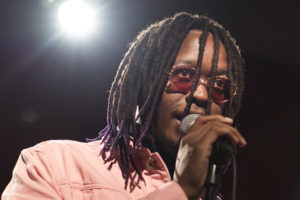
THE TEETA: “All this has been very emotionally draining. I feel overall that this is a great thing that people are becoming aware of [racism] and saying that it is actually a reality instead of something that’s far removed for themselves, you know?”
TEE DOUBLE: “I think it’s beautiful. You know, it’s like, they see us now. And a lot of different people are getting affected by the police. You see videos where people are getting pushed down and pepper-sprayed and all this – white people, Hispanic people. Everyone is feeling what black people have been feeling for years. And I think that once you put yourself in their shoes, you can kind of understand that.”
CHIEF CLEOPATRA: “I do feel the more people that realize what’s going on, and the more that they want to help, it’s definitely a sign for positivity and change. More people are stepping up now and speaking up and I think it will make a difference. Now, do I think it’s going to happen overnight? Absolutely not. People are going to have to keep pushing for it, and not just have it churned out for a few weeks. That’s the only way that we’re going to be able to push that type of evil out.”

JACKIE VENSON: “A lot of this is more of the same, but enough of it is not that it feels a little bit different. It feels like there is still light at the end of the tunnel. But it’s still pretty far away. We accelerated a tiny bit, but we’re still behind.”
MOBLEY: “I was talking to a friend of mine the other day. You know, I may be wrong about this, but there’s a quality that the current moment has that is not so different to me from something that happens in relationships between people, whether it’s a friendship or romantic relationship. You’ll get in an argument or you’ll be in a heated conversation and someone will say something. Both of you will look at each other because you know that someone has said a thing that can’t be taken back, and that the nature of your relationship is now going to be different moving forward. You can’t ignore the thing that’s been said, and it’s going to have to be dealt with. There’s a quality in the air. This reminds me of that feeling. A lot of people, especially young people, are not going to be willing to go back to the status quo before the pandemic and before these uprisings, things that were not acceptable in mainstream discourse are now acceptable in mainstream discourse. And I think that people who crave change won’t let that one let that go back. Now, will there be a backlash? That seems entirely possible. Who can say how swiftly the change will come? But I have a sense. There are too many of us now who won’t be satisfied with just gestures. It’s going to take more than that.”
This is not new. This moment in time comes only after centuries of protracted and systemic racism, exemplified through encounters with police, and passed on through generations.
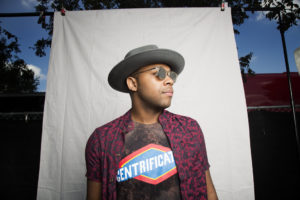
MOBLEY: “Modern policing in the United States evolved directly from slave patrols and posses and militias that were set up with the explicit task of protecting the interests of the white property-owning class, whether that meant committing genocide to clear indigenous Americans from lands that white people wanted to settle, whether that meant recapturing enslaved people who had freed themselves. That evolved into a force responsible for enforcing the Jim Crow laws. A law is only as strong as the willingness of the people in power to enforce it. It’s really important to remember any sort of legal discrimination, any sort of legal injustice that was inflicted on people historically, the police were the foot soldiers of that project. Without them, it wouldn’t have been possible. So racist repression has been central to the role of the police for as long as there have been police in this country. I don’t think it should come as a surprise to anyone that that remains true. It is the way it is, because that is the way that it was designed to be.”
TEE DOUBLE: “Black parents are always. ‘When you go somewhere, don’t appear menacing. Keep your hands out of your pockets. Don’t touch anything that you’re not going to buy. Smile often.’ My parents and their parents and their parents went through where they had to cross the street if a white person was coming towards them. My grandparents couldn’t look a white person in the eye without it being considered threatening. It gets to me and I have to tell my child, ‘Make sure you know, you do this. You do that.’
THE TEETA: “My parents never let us play with toy guns, for instance, because, you know, they always told us the police will say you have a gun and kill you. And this was before Tamir Rice. When I was about maybe about twelve, thirteen, we were like being fancy jaywalking. And [the police) handcuff us, set us on the curb. Really. We didn’t even know what jaywalking was.”
MOBLEY: “Racism is such a thoroughgoing feature of social life in this country. I think it would be difficult for anyone to prep someone for the totality of what it means, especially a child. My parents emphasized my own dignity, my own humanity, a respect of myself and other people. This is something that most parents of black children do. Just giving me the tools in terms of critical thinking, in terms of a willingness to confront moral lapses as I see them giving me the tools to work out for myself what it meant to be black in a fundamentally racist society. But, you know, I think for a lot of us, probably most of us, it’s too big to just explain to anybody. It’s a thing you kind of have to figure out for yourself.”
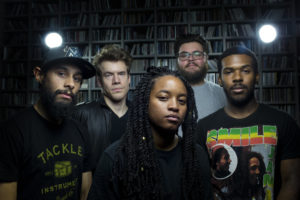
MEGZ: “It comes down to upholding a general system. This thing of authority up here, [the police] don’t necessarily want to be level with the average civilian. It’s almost like they have to be seen as above us, they have to be in this position of power. Leadership can’t necessarily look like: ‘I’m the boss, I’m calling the shots’. Leadership should be interactive, a collaboration. That is leadership that I feel like our country has never experienced. This was something I thought of watching the Michael Jordan documentary because he was such a mean person. But he got that championship ring. When you’re asked to do that kind of psychological damage to someone to get a championship ring, or in this case, to get the result that you want, that can’t be what leadership looks like in our community. You have to be able to talk to people, you have to be able to collaborate with people. You have to be able to engage. You know, you can’t just show up on the scene because it’s human nature to be defensive to that kind of behavior. If you know, you’re hanging out, you’re chilling. You’ve done nothing wrong. If someone comes at you and assumes that you’re a criminal or assumes something bad about you, you instantly get defensive. And so now we can’t get anything done because you’re hyperreactive.”
CHIEF CLEOPATRA: “I grew up in Corsicana, and I recently just found out that I had a cousin back in the day who was brutally murdered by the cops in ‘ 93. His name was Craig Thomas. They had a protest in Corsicana last weekend, which was the anniversary of what happened to him. They were worried that things were going to pop off and they had the National Guard in Corsicana, of all places.”
MOBLEY: “Obviously, I’m a black person, and that has always colored my interactions with police. I have had no shortage of negative interactions where my dignity was assaulted. But I have never faced any kind of mortal violence. The thing that kind of activated me on these issues first was seeing the response to the murder of Eric Garner, not just the response on the part of the state and the machinery that is supposed to seek justice in those circumstances. The thing that really aggravated me was seeing this man get killed, choked to death in broad daylight. And looking around at the rest of the people around me, particularly white people, and just being overwhelmed by the profound indifference to his plight. It was a real eye-opener.”
“I routinely get pulled over when I’m driving around the country on tour. Rarely do those stops end with any sort of citation. Frequently I’m asked to get out of the car. I’m asked whether I have an arrest record or a criminal record and responded to incredulously when I say I don’t. There are any number of assaults on dignity that happen.”
TEE DOUBLE: “ I would love for the day to come where black parents don’t have to tell their children. ‘ No matter how successful you become, you’re always black’. That’s always gonna be the thing keeping you back. You have to work a thousand times harder.’ I want to get to the point where everybody is just a person, you work hard, you succeed. A lot of these parental conversations, I hope they dissipate over the years. But there has to be action. The politicians who are kneeling, marching with people, that’s a great photo op. I love how that looks. But what laws are you passing? What laws have you passed the 40 years you’ve been in office?”
We all like to believe that Austin is an enlightened and progressive city, but for people of color, this can be far from the truth. The April shooting of Mike Ramos is just the latest of a long history of police violence against African Americans.
THE TEETA: “Austin. I think it’s marketed as all these great things, but it’s segregated. And it was designed that way. It was built that way. And I would just like to see that instead of gentrification that just comes with ignoring the fact that they’re black and brown people already here on this side of town, you can put funding towards building up a community that’s already here in place. And not just fuel capitalism. Put more effort towards the educational foundation on this side of the highway, some of that overspending that’s going on with the police.”
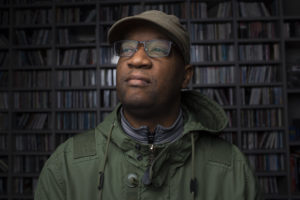
TEE DOUBLE: “When I was younger and I was at Maplewood Elementary, the police would come and do Police Day, they would open their trunk and they would give the girls stuffed teddy bears, they would give everybody a police badge sticker. There was a real community bonding, like, we’re here to help you. If you need anything, call us. Now, when you see the police and they go into their trunk, they’re getting a shield. They’re getting a baton. They’re getting a rubber bullet gun. Remember Police Ice? He was a Hispanic police officer. He would go around to different schools and rap, talk about police interaction and sing along with the kids. And he was loved on all parts of the town. We need more action like that. Police don’t have to become rappers. I’m not saying that. But they need better interaction when they go into these neighborhoods. If you go into a neighborhood, go in there to sit down and meet. Who lives there? Don’t go in there strong-arming and saying ’Get out my way’. The police have to be more willing in actions to show that they’re here to help as well.”
MEGZ: “I actually wanted to be a police when I was a kid. It was first on my occupation list growing up. New Orleans is a predominantly black city, and you know, they have their issues. But what you see is more community policing because the people that are policing you look like you. They understand the community. They understand you as a person. I have a lot of family in law enforcement. So for me, it was never a thing that I was afraid of police because I knew I could call on a family member or that the cop, they may know my family member. When I moved to Texas and my very first week in school after Hurricane Katrina, the police were called on me because they accused me of being in a gang. And this is when I started to see the fracture in the system. You know, I’m literally like a month removed from Hurricane Katrina. I’m missing home. I’m drawing. And I have like a little picture of the Superdome and the seven – I was raised in the 7th Ward – and bubble letters I have. It was just a drawing. My teacher, she takes my notebook up and she sees it as threatening. She sees it as gang-related. Turns it into the principal. And the police come to get me out of class and tell me that I’m going to be suspended. They had no real evidence that this was actually gang-affiliated, which it was not. And they just decided that I was guilty of it, and I was suspended for three days. It was my first week at school. I’ve always carried that around, being seen as a criminal when they don’t even know you. I mean, I think that’s the heart of what we’re talking about when these things happen. I never before experienced the injustices of the system. But when I moved to Texas, I started to see how policing impacted my community. Criminalized me from the moment I stepped through the door, and that’s when my relationship with the police changed forever. I was maybe like 12, 13 years old. And it’s never been the same.”
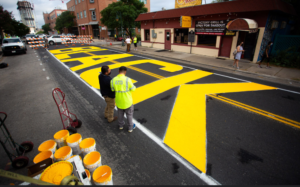
TEE DOUBLE: “Usually a policeman who comes into a black neighborhood is not black. Most policemen who patrol the Eastside are white cops. You need people in the community who look like the community to ease the tension. You know, I don’t see tons of black cops patrolling Westlake. If I’m a black cop and I go into a black neighborhood and I see something happening, I can relate and say, oh, I grew up that same way. They say, man, your mother wouldn’t like that. Or I know your parents. Right? Now a cop comes into your neighborhood and they don’t look like you. They don’t understand the way you talk to your friends so they can take it as being threatening. Because you might be louder than the average person when you talk. They’re like, calm down. Why are you so excited? And it’s like, should I whisper? You know, do I have to cower down to you because you’re a cop? No, you’re a person just like I’m a person. And if we both had that understanding, then it works out. You’re actually here to protect me. And once that goes out the window, you see cops pushing people down on the ground. That older gentleman in Buffalo that they pushed down the other day, another cop actually tries to lean down to help him. And another cop pushes that cop, says, keep walking. That sums up the problems right there, you know, not all cops are bad cops, but the cops who try to be good, are pushed by the bad ones.”
THE TEETA: “Here in Austin, it’s never been a good thing. White people look at the police as something that represents safety. I’ve never looked at the police and felt safe. They’ve never helped me with anything. Anytime the police were called, even if I was the one in trouble, it still ended up worse than it would have been if we would have just left the police out of it.”
TEE DOUBLE: “In black households, in black communities. Calling the police is the last, last, last thing you want to do.”
Discrimination is not exclusive to the police in Austin. It permeates everything, even our treasured music community.
JACKIE VENSON: “In Austin, mostly I see microaggressions, subliminal, not overt so they’re harder to prove. Honestly, that’s the worst kind. But it’s there. What did they do? They didn’t do one thing, it’s what they’ve done over fifteen years. That’s what it is in Austin. It’s hard to do anything about, especially as one person, you know. And it’s hard to convince people when really, it’s right in front of our faces all the time. You know, I tell people, before the lockdown, next time you go out, look at what’s being promoted and then tell me who you see. Tell me who ninety-seven percent of the audience is. And tell me who’s on stage. And like, once you see it, you’re not going to be able to unsee it.”
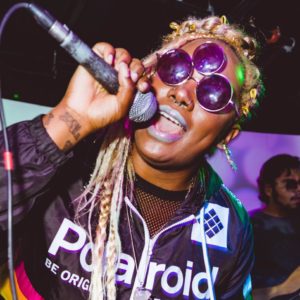
CHIEF CLEOPATRA: “I’ve only been a solo artist for about a year, and though I’ve had a stroke of streak of luck, I’m wondering how easy is it going to be for me to get played on the radio. I’ve been like I’ve been struggling with that. And I’ve noticed that other black artists have been struggling with it too. And, you know, it does hit you because, you know, you feel like music is just good and you know, why not? I can’t really say that it is 100 percent of me feeling like there’s discrimination. But it does make you think, OK, where is my place in Austin music scene?”
TEE DOUBLE: “When I started doing shows, we couldn’t even get booked on Sixth Street. Now, well before the pandemic, it was hip hop everywhere. Hip hop is a mainstay down there. Well, when I started, they were like, you guys aren’t professional. How many people do you plan to have? What is the imagery I’m going to bring to my club if I have five hundred black people in here, regardless of if they’re spending money? Before we even got to a money conversation. It was all these questions.”
MEGZ: “Even if we’re not specifically talking about racism, a lot of women in the industry feel that there is definitely there’s this hierarchy going on. We’ve been undervalued. This is how the music industry looks. Since how have we far back we can remember? And now in Austin specifically, you see people just kind of playing off of that. There are ideas about what hip hop is, where rap is, just like their ideas about where blues was and, you know, jazz. And they take that stigma and it shows itself in how we’re booked and how our lineups are designed. Can’t have too many rappers, can’t have too many black artists in one spot. You see it and how they engineer music, it’s deeply embedded in everything. It goes so deep, you know, the demeanor, the microaggressions, the tone in which you talk to me. I’ve been in so many situations where I felt like I was being talked down like a child. I’ve been doing this for almost 10 years. So to treat me like I don’t know what I’m doing or that I’m not a professional, it really shows that this is embedded in the culture of the scene.”
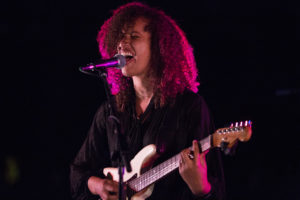
JACKIE VENSON: “What I see in the Austin scene is, number one, a lack of creativity and a lack of desire to really want to dive deep into the soul community of talent. I’m talking about not just like Austin proper. It’s been super gentrified. I’m talking about Manor and Pflugerville, Round Rock and Leander. Opening it up to the places where it has been historically proven that black people have been pushed out to. And then the second thing is like this weird, like fear of who’s going to show up to the show. When I hear there’s not enough talent black talent in Austin that draws the crowd, what I’m really hearing is the black talent in Austin that draws a crowd draws the kind of crowd that we don’t want. We don’t want your crowd here. That’s what I hear, because that’s what they’re saying, it’s just blatantly untrue. That was the most disheartening thing I’ve heard in a very long time.”
“That’s why the hip hop scene has is struggling so much in this town. First of all, hip hop is kept out of all the major press and stations from this town. There are a few exceptions. And the reason why is because even when they try to put on a show, only a few venues will accept them. If you go to booking sites, you’ll find, like 80 percent of venues in any city are going to say no hip hop, no hip hop, seriously. It just says it on the website. It’s the same thing. We don’t want your crowd here. We don’t want your music here because it’s going to draw a crowd of people that we are made uncomfortable about when they are in large numbers. We don’t like being around large amounts of black people. Seriously, it’s just what they’re saying.”
As more people are finally starting to listen and understand the depths of our racial discrimination, what can we hope to see coming out of this discussion?
JACKIE VENSON: “In a venue where black performers are being kept out, the staff can strike. The staff can speak out, out a person, so that they’re forced to change publicly or people can stop supporting their business. That’s why it’s really helpful to out people. It’s not enough to individually not be racist anymore. You have to be anti-racist. The difference between being not racist, and anti-racist is that when you are not racist, you have a love for all people and you do your best not to judge anybody. You don’t use slurs and you’re not mean to people because of what they look like. That’s not being racist But being anti-racist, it’s all about being careful about where you put your money. Careful about who you elect into your city, into power, into education, into seats on the council. That’s being anti-racist. That’s harder That requires research That requires you to think about everywhere you shop and everywhere you eat. So the bartenders that work at a club that doesn’t let black music in, if you’re working for a racist establishment, you might not be racist, but you’re definitely not anti-racist. You can walk out of this place and look out this place that’s being anti-racist. That’s what we need to be. That’s how you change it. You wake up every day and you’re considerate of the problem that we have as a community and you actively do things to defy it.”
THE TEETA: “[Police} should be held to the same standards as civilians. If we just decided to kill people and commit acts of violence towards people, we’d be incarcerated. And I believe that they should be held to a higher standard if they’re supposed to be the authority.”
JACKIE VENSON: “Let’s just start right now. I’ve seen a little bit of that. The council had a public meeting about divesting 80 million from new weapons and talking about the things they were going to do with that money instead. I think that we all want the same thing. I mean, if you’re just a reasonable thinking human, wouldn’t you agree that a police officer should also be trained in social work? This isn’t radical. It’s so obvious. It’s actually radical that it hasn’t happened yet. It’s radical that we’re living this way. That’s radical.”
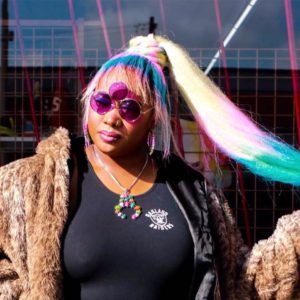
CHIEF CLEOPATRA: “The president has a lot of leverage. And regardless of it being Trump or whoever, we’re supposed to be leaning on them during hard times, you know. And I have not really seen Trump fairly address the problems that, in fact, he’s denying the problems. That’s a slap in the face because it’s like we have all these facts. I feel like the president should be addressing us, comforting us in this time of a horrible mess. We’re not getting that. Even today, I read he is getting ready to start his first rally in Tulsa. And I’m just like, are you serious? You’re going to the place of the black Wall Street massacre? You are so insensitive to what is going on. And as many people as he pulls in in influences, I feel like if he were on the right side of the coin, there would be a diffusing of emotions. I’m not saying people would not still be angry, but I feel like there would be an assurance. The President is on our side. He’s had many times to prove that he is a man of honor and it just not it just hasn’t happened.”
MOBLEY: “I don’t think that so-called leaders have historically been responsible for the most vital and necessary changes to our social systems, our moral systems. Historically, the people who have been responsible for that, are the people on the ground, people living relatively small relatively and anonymous lives, making courageous moral choices collectively and forcing the hand of so-called leaders and those in power to recognize the moral realities that they assert. I guess the question of what the role of leaders may be in implementing the changes needed is not as important as we like to think it is. Absolutely they have tremendous power. They could, with the stroke of a pen, change things in a truly fundamental way, alter the course of people’s lives dramatically. But I don’t think that we can be content to hope or wait for that. I think I think the onus is on all of us collectively who are committed to moving our society to a place where we can be proud of the way that we treat everyone in our society, to start making those changes and to push those who are invested with greater power than ourselves to either get on board or face consequences.”
THE TEETA: “This whole thing has been approached over and over and over, hundreds of years we have approached this. We’ve done our best to participate in the political process and try to be diplomatic about it. But we’re dealing with the same stuff now that we were dealt with in the sixties, Martin Luther King and Malcolm X and John F. Kennedy and all of them. Do you think that in their minds they thought that in the year 2020 that we would be still dealing with the same issues? Why are we dealing with the same thing?”
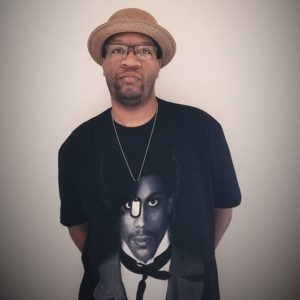
TEE DOUBLE: “We need the police. Or It’ll be the wild, wild west. But I think the police need more training. I don’t think the police should be militarized like the army. When they come into your neighborhood with tanks and they’re so bulked up with gear, like even if they don’t say, ‘I’m here to beat your ass’. Just the look of them, you know, they’re probably going to. And now cops, they have this blue line that when they do something, everybody is going to support them. The cops in Buffalo who pushed the guy down went to jail, but 57 cops resigned over that. When I become seventy-five, a young guy pushes me down and I start bleeding out the ears and everybody just walks over me, how would I feel about that? Think about what if that’s you on the other hand. And when you start empathizing with other people, it makes you pause and say, well, I’m not going to do that. But the police, a lot of the police, they’re just like, I’m gonna go out there and you know, everything is a nail and I’m the hammer. I’m gonna hit everything. You’re peacefully protesting, you have a mask on, you’re chanting and yeah, you’re mad, so you’re going to jail. I shouldn’t be upset if you’re yelling in my face because, yeah, you’re kind of pissed off. But instead, the police spray. They beat. They push. If you have police who will say, no, I’ll turn in a bad cop, that’s when things can start. Police, they usually tell, you know, people of color if you’re in see a gang or a drug, ‘if you see something, say something’. That’s their main tag line. But they see a lot and they say very little. So lead by example.”
JACKIE VENSON: “We put regulations in place to stop this blue code thing from happening. We put policies in place to make it so that a cop can be anti-racist without losing their job. We put policies in place that make the training longer than six months. A doctor trains for 10 years. Treat the job more like we treat all the other jobs that deal with human lives. We need to treat them like we treat doctors. The training needs to be intense. We need to treat them like any other occupation that deals with human lives. We train them in social work. We don’t put so much money into weapons. We have different types of cops, nonviolent cops that don’t carry lethal weapons. Sometimes there’s a real situation where you really do need a cop with a gun to show up. Maybe there’s like some kind of like crazy firefight going on between some gangs. It happens. So that’s when you in bring in the police that have lethal weapons, and they require more training. Maybe they are in training for six years instead of four. I’m spitballing ideas because the way that we do it now isn’t working. Somebody dies every day and they’re disproportionately black or brown in every state and every city in this country.”
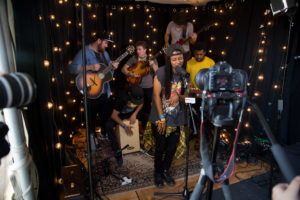
MEGZ: “What we experienced in the past, it’s a very real thing for us. There are stereotypes about us. There are things that people actually believe that aren’t true. There are actually studies that say black people can tolerate more pain than white people. I do think that it is almost ingrained. It’s one of those things where if you’ve never been taught otherwise, you never try to see it in any other light. You know, because as a white person with privilege, as a white person, with opportunity. Why would you change how you think? I don’t think people even attempt to gain that kind of perspective. And so that’s the situation, you’ve already have made up your mind about who I am. I would respect police work if they went the extra mile to gain some perspective. I know it’s a difficult thing because life could be at risk or, you know, you have to make quick decisions. But there’s the whole point of a profession is you need to learn how to do the job. You know, you can say the same thing about a doctor. It can be a lot of pressure. But people do it every day. And that’s the whole point of getting it. You swore in to do the job and to do the job right. So I have to hold you accountable for that. I think it’s obvious that the entire function of the system has to be torn down and rebuilt. And I don’t necessarily just mean reform because reform would suggest that you are taken, which you already have, and tweaking it a little bit. This goes a lot deeper than that. You almost have to reconstruct it completely.”
MOBLEY: “ I know there are a number of reasons why people may act as though [defunding the police] is a complicated notion to understand. We live in an era where certain political factions have called for Planned Parenthood to be defunded. They’ve called for defunding Obamacare. They have put into practice defunding education and arts funding and all sorts of things. At no point during all of that did any of us profess any confusion about what was meant. It’s an utterly simple and straightforward statement. And I think that the idea of defunding the police does frighten some people because of where their political interests may lie, whether they be on the right or the left. And I think that some people will kind of opportunistically want to co-opt the momentum of those ideas and kind of transmute that that energy into more reformist policies. It’s my view that it’s not a thing that can be fixed. It’s a thing that must be replaced. Even if I grant that it is possible to fix it, even if I were to grant that it was possible to reform it. I think those of us whose lives hang in the balance. Those of us who represent the statistic that one in a thousand black men will be killed by a police officer, we have stood patiently enough as reform after reform, after reform has been proposed has been, to varying degrees of enthusiasm and commitment, implemented over the course of nearly two centuries. And we are still here at a status quo where black men are two and a half to three times more likely than white men to be killed by the police. If your answer to a human moral emergency on that scale is slow and measured change and slightly fewer people getting killed every year, people with irreplaceable lives, people whose families can never, ever be compensated for the loss of those lives, not to mention the loss of potential, loss of possibility, the loss of dignity, all of the ways in which this current system taxes the people under its heel. If your response to that moral emergency is ‘wait’, then I don’t think I have anything to talk to you about. I don’t think we are operating under compatible moral systems. It isn’t something that can be waited upon. It’s something that must be ended now. Reforms simply won’t accomplish that. There is a moral imperative, in my view, to do away with the current system of things and replace them wholesale and across all parts of society with a comprehensively new system that protects and affirms the dignity and possibility of all people.”
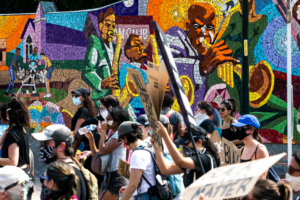
JACKIE VENSON: “Wouldn’t you like to live in a world where you don’t have to think about this stuff anymore? Wouldn’t you like it if a system is set up to weed some of this stuff out before it even manifests? Wouldn’t you like to think about all the stuff that could come along with that? We could put more money back into education. And that could benefit all of us, every single one of us in so many ways. Maybe racism doesn’t affect you, like physically to your face, but it affects you in sinister ways where we’re keeping people out, people that could have changed our country and our lives for the better. A favorite quote of mine is, I’m less interested in the new things in Albert Einstein’s mind. I’m more interested in the geniuses of equal caliber that died in sweatshops. Imagine all the people over the last 400 years that this country has gone around, all the geniuses that were forced into slavery. You know, this kind of stuff could benefit all of us if we let all of the minds in our country thrive. We can reach incredible heights. We’ve already reached pretty good heights, not letting all of our country thrive. Imagine a world where everybody gets the chance to thrive and we all benefit from each other’s no genius in trying. Wondering what can you do today to be anti-racist? Watch Netflix and check out a documentary, something that you usually wouldn’t watch. Just that one thing. That’s the thing that you did today. You watched TV, but you learned something and now you’re going more aware. It’s a muscle. Imagine anti-racism as a 10-pound weight, you just pick it up and do like 30 minutes of crunches a day. Read a book. Justify it. Go against it. Not that hard. You just have to learn stuff.”
MOBLEY: “When I was in my very early 20s, I would be more willing to kind of offer up a detailed account of what racism looks like. I grew increasingly impatient with that exercise at a certain point. There are 200 years of literature, people detailing the grand systemic scale, the intimate and personal scales of what the problem means, people whose entire careers, lifetimes have been spent journaling and detailing. If you’ve literally never considered this, even though hundreds and thousands of people have been trying to point your gaze toward it, I just don’t have the patience any longer for that. At a certain point, the fact that I say it exists has to be good enough. You could fill libraries with all the words that have been written about what this thing is. It is a real thing, a real problem, a deadly problem. And it must be taken seriously simply on the grounds that millions of us are saying that it is happening.”
